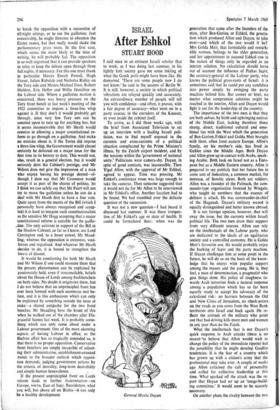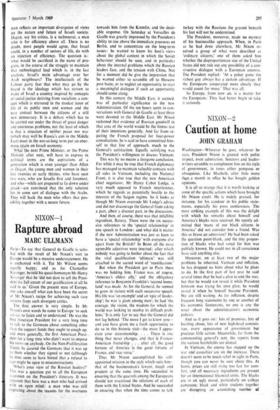After Eshkol
ISRAEL STUART HOOD
I said once to an eminent Israeli scholar that to work, as I was doing last summer, in his tightly knit society gave me some inkling of what the Greek polis might have been like. He demurred. 'There are some people now I do not know,' he said in the accents of Berlin W. It is still, however, a society in which political vibrations are relayed quickly and accurately. An extraordinary number of people will tell you with confidence—and often, it proves, with a fair degree of accuracy—what went on in a party caucus, in the corridors of the Knesset, or even inside the cabinet itself.
To arrive, as did three weeks ago, with the brief from Associated Television to set up an interview with a leading Israeli poli- tician, was to find myself exposed to the currents and cross-currents of a political situation complicated by the Prime Minister's illness, by the Zurich airport incident, and by the tensions within the 'government of natiqnal unity.' Politicians were camera-shy. Dayan, in spite of good contacts, was inaccessible. Then Yigal Allon, with the approval of Mr Eshkol, agreed to appear. Time was pressing. Mr Eshkol's conference room was large enough to take the cameras. Then someone suggested that it would not do for Mr Allon to be interviewed in Mr Eshkol's office. Another location had to be found. We had stumbled over the delicate question of the succession.
It was not a new question—I had heard it discussed last summer. It was there irrespec- tive of Mr Eshkol's age or state of health. It could be formulated thus: when was the
General Moshe Dayan
generation that came after the founders of the state, after Ben-Gurion or Eshkol, the genera- tion which produced Mon and Dayan, to take over—and which of the two would it be? Mrs Golda Meir, that formidable and remark- able woman, belongs to the older generation, and her appointment to succeed Eshkol can in the nature of things only be regarded as an interim solution. No calculation should leave out of account the influence of Pinhas Sapir, the secretary-general of the Labour party, who knows the political grass-roots of Israel: it is sometimes said that he could put any candidate into power simply by swinging the party machine behind him. But sooner or later, no matter what compromise solutions might be reached in the interim, Allon and Dayan would fight it out for the leadership of the country.
The importance of the two men is that they are both sabras, by birth and upbringing natives of the Middle East, lacking therefore those strong, direct, traditional cultural and emo- tional ties with the West which the generation of Ben-Gurion,Eshkol and Golda Meir brought with them, often from eastern Europe. Allon's family, on his mother's side, has lived in Galilee since the Middle Ages. Both ,Dayan and Allon grew up in contact with Arabs, speak- ing Arabic. Both look on Israel not as a Euro- pean but as a Middle Eastern country. Alton is prepared to say publicly that her future lies in some sort of federation, a common market, for instance, of Semitic states. Both are soldiers. Allon was a founder of the Palmach, the com- mando-type organisation fostered by Wingate, who taught its members that the essence of defence is attack. He was commander-in-chief of the Haganah. Dayan's military record is equally distinguished and better known abroad.
It is not foreign opinion, however, that will sway the issue, but the currents within Israeli political life. The two men draw their support from very different sources. Mon can rely on the intellectuals of the Labour party, who are dedicated to the ideals of an egalitarian society and a controlled economy. He is Golda Meir's favourite son. He would probably enjoy the backing of Sapir and the party machine. If Dayan challenges him at some point in the future, he will do so on the basis of the know- ledge that he enjoys wide popular support among the masses and the young. He is, they fed, a man of determination, a pragmatist who gets things done. His policy of toughness to- wards Arab terrorism finds a natural response among a population which has so far been equally ready to accept his advocacy of the calculated risk: no barriers between the Old and New Cities of Jerusalem, no check-points on the roads as you cross from the West Bank territories into Israel and baek again. He re- flects the attitude of the military who point out that bad. driving kills more men and women in any year than do the Fatah.
What the intellectuals fear is not Dayan's quick response to Arab attacks (there is no reason *to believe that Anon would wish to change the policy of the immediate riposte) but the possibility that he might develop Gaullist tendencies. It is the fear of a country which has grown up with a citizen's army that the professional may take over. A couple of weeks ago Allon criticised the cult of personality and called for collective leadership at this time. What sparked off the attack was the re- port that Dayan had set up -an 'image-build- ing committee.' It would seem to be scarcely necessary.
On another plane the rivalry-between the two men reflects an important divergence of views on the nature and future of Israeli society. Dayan, say his critics, is a technocrat, a man who is for efficiency above all. There is no doubt, most .people would agree, that Israel could, in a number of sectors of life, do with an injection of efficiency. The question is: what would be sacrificed in the name of pro- gress, in the course of the struggle to maintain that technological lead which is, in the last analysis, Israel's main advantage over her Arab neighbours? The intellectuals of the Labour party fear that what may go by the board is the ideology which has striven to make of Israel a country inspired by concepts of social justice deriving from socialism, a con- cept which is mirrored in the modest tenor of life of its public men and women and the easy contact between the citizens of a still new democracy. It is a debate which has to be carried out under the threat of great danger and enormous problems, not the least of which is that a situation of neither peace nor war (which may well be Russia's aim in the Middle . East) must in the not-so-long term put an enor- mous strain on Israeli economy. Whai 'the next Prime Minister, or the Prime Minister after next, will have to express in. political terms are the aspirations of a generation which is even younger than Allon or Dayan, the young men and women in their late twenties or early thirties, who have seen two wars, who are Israelis first and foremost, and who—while not prepared to lie down under attack—are convinced that the only solution lies in some sort of dialogue with the Arabs. They will back the man who offers that pos- sibility together with a secure future.



































 Previous page
Previous page